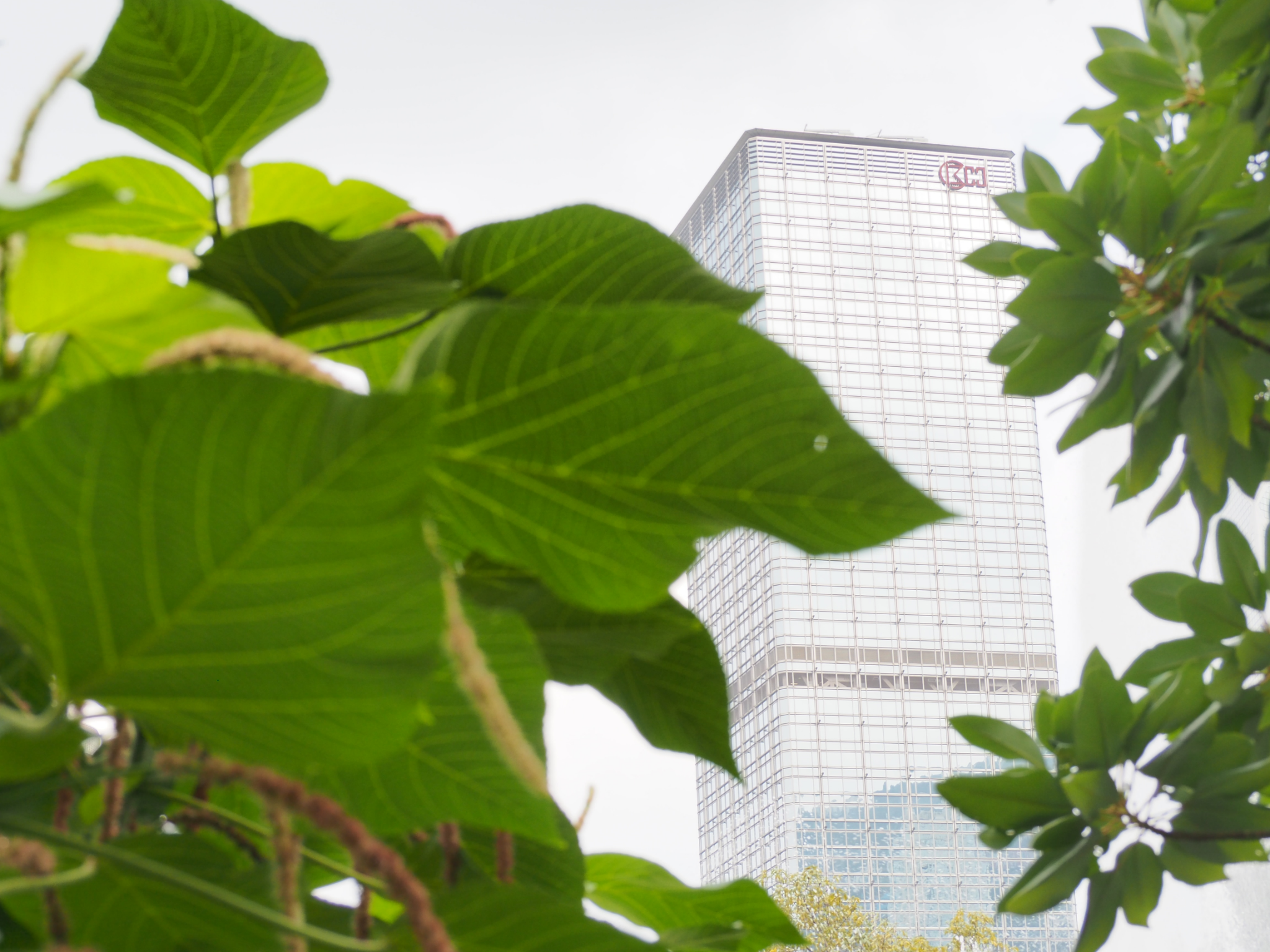|
|
As society becomes more environmentally conscious, businesses must adapt to meet this rising demand for sustainable practices. The onus is on companies to incorporate ‘green’ practices into their operations and demonstrate real commitment to environmental sustainability.
One robust way for businesses to validate their eco-friendly strategies is through green business certification, an endorsement that signifies a company achieves particular environmental standards.
What Are The Green Business Certifications?
Green business certifications serve as an independently verified seal of approval for companies that prioritize ecological considerations in their operations. These certifications indicate that a business’s processes, products, or services meet precise environmental standards and comply with relevant legislation.Photo byYoyo Dy onUnsplash
Green business certifications comprise various categories, mainly targeting energy efficiency, waste minimization, water conservation, pollution reduction, and broader environmental sustainability. They are a popular means for businesses to showcase their commitment to a sustainable future.
Benefits of Green Business Certification
Green business certifications give businesses a competitive edge by setting them apart as industry leaders in sustainability. They bolster a company’s reputation, attract eco-conscious customers, and enhance stakeholder confidence. Certifications also motivate companies to invest in sustainable practices, driving both local and global environmental improvements.
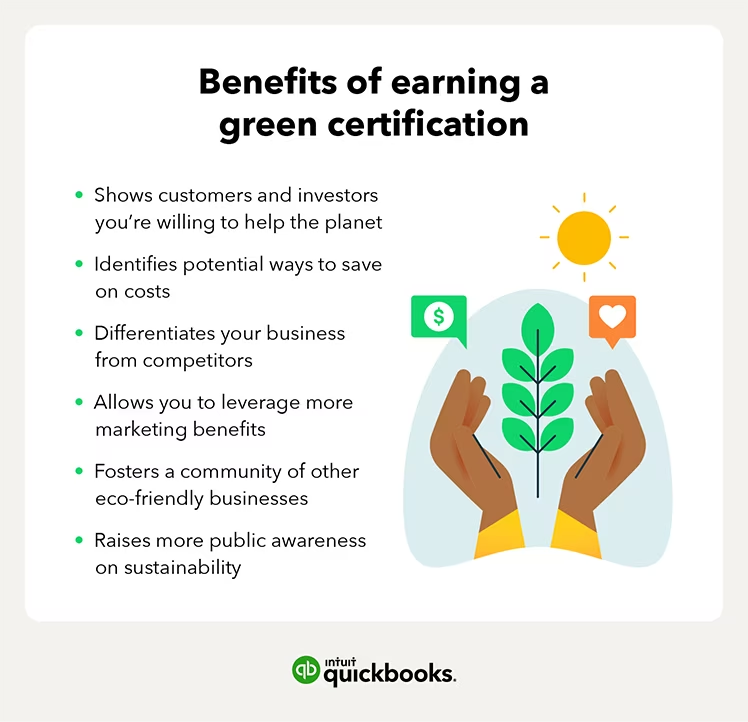
Source: https://quickbooks.intuit.com/r/green/small-business-eco-certifications/
Being certified implies rigorous audits that lead to identifying areas for improvement in energy and water consumption, waste generation, and carbon footprints. These insights can translate into significant cost savings for businesses by reducing waste and enhancing resource efficiency.
Notable Green Business Certifications
Here are some renowned Green Business Certifications that validate a business’s efforts toward sustainability:
LEED
Leadership in Energy and Environmental Design (LEED) is an internationally recognized green building certification system. Developed by the U.S. Green Building Council (USGBC), LEED provides a framework for healthy, highly efficient, and cost-saving green buildings. The certification is a globally recognized symbol of sustainability achievement and leadership.
LEED certification is a performance-oriented rating system where a building project earns points for various green building strategies across several categories, such as sustainable sites, water use efficiency, energy and atmosphere, materials and resources, and indoor environmental quality. The certification levels – Certified, Silver, Gold, and Platinum – depend on the total number of points the project has achieved.
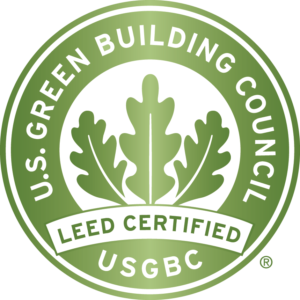
In essence, LEED promotes efficient and cost-saving green building design, construction, and operations. It emphasizes human health and well-being within the built environment. Buildings that are LEED-certified have lower operating costs, higher building value, and increased occupant satisfaction.
They also incorporate numerous strategies to reduce their negative environmental impacts, such as reducing waste, conserving energy, decreasing water consumption, and driving innovation. For these reasons, LEED certification is looked upon favorably by many industries and governments worldwide.
ISO 14001:
Primarily an international standard established by the International Organization for Standardization (ISO), ISO 14001 is a green business certification that focuses on an organization’s environmental management systems.
This business standard is applicable globally, irrespective of any organization’s size, type, or nature. It aims to help businesses reduce their environmental footprint by providing valuable guidelines for more efficient resource use and reduction of waste.
ISO 14001 requires companies to identify their environmental impacts and continuously improve their environmental performance. The certification is not mandatorily compliance-based; instead, it is a toolkit to help organizations build effective systems to manage their environmental responsibilities.
It is esteemed by companies worldwide for its comprehensive nature, including areas such as environmental policy, planning, implementation, checking, and management review. Businesses with this certification send a clear signal to stakeholders that they are dedicated to containing their environmental impacts and working towards global sustainability.
B Corp Certification:
B Corporation (B Corp) certification, conferred by the nonprofit B Lab, is reserved for for-profit organizations committed to meeting rigorous social and environmental standards. The assessment considers a business’s entire operation, including its impact on employees, customers, community, and the environment.
To acquire the certification, a company must score at least 80 out of 200 points on the B Impact Assessment and amend its legal structure to become a “public benefit company,” committing to balancing profit with purpose.
The advantages of obtaining B Corp certification are significant: it provides a business with a positive public image, opens up new avenues to conscious customers and investors, and helps it stand out from competitors. The certification is a mark of trust, showcasing a company’s commitment to positive change and corporate responsibility.
Green Business Bureau:
Green Business Bureau is a trusted authority in green business, offering a certification program to enterprises committed to sustainable business practices. They provide an online assessment tool and a comprehensive roadmap that helps businesses understand and execute the steps necessary to become more environmentally responsible.
The certification process involves earning EcoPoints through the implementation of green initiatives. Businesses are given a Green Business Bureau seal as they reach various levels of achievement on the EcoPoints ladder, starting with a ‘Green’, progressing to ‘Gold’, and finally achieving a ‘Platinum’ Certification.
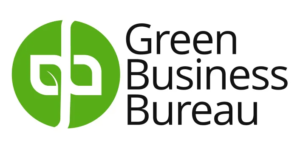
This certification is highly recognized among businesses because it is scalable and flexible, catering to the unique needs of different businesses. It also promotes continual improvement and focuses on green initiatives. Furthermore, becoming Green Business Bureau certified demonstrates a commitment to sustainability that resonates with consumers, clients, and employees.
Green Seal
Green Seal is a U.S.-based nonprofit organization that provides science-based environmental certification standards to help manufacturers, service providers, and consumers make responsible choices.
The certification process goes above minimum compliance levels to beyond, promoting sustainability and reducing environmental impact. Products and services must meet strict, science-based environmental leadership standards to attain a Green Seal certification.
These standards cover everything from the raw materials, manufacturing process, use, and even disposal. The organization’s certification is a trusted mark in the industry, providing independent verification that certified products, services, and companies are truly green and environmentally responsible.
Rainforest Alliance
The Rainforest Alliance is an international nonprofit organization that certifies farms, forests, and businesses that follow sustainable and socially responsible practices. Their certification is a globally recognized standard awarded to products or services that originate from farms that meet a comprehensive set of environmental, social, and economic criteria.
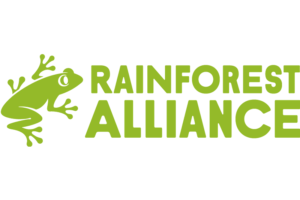
source: https://www.isealalliance.org/community-members/rainforest-alliance
These include biodiversity conservation, improved livelihoods, and human rights for workers and local communities. This certification gives consumers the assurance that the products they buy have been sourced responsibly, making a genuine difference to people and the planet.
Carbon Trust Route to Net Zero Standard
The Carbon Trust Route to Net Zero Standard is a certification mark provided to organizations that are successfully measuring, managing, and reducing their carbon emissions. The Certification must be renewed every two years, providing an incentive for continued commitment to carbon reduction. It helps organizations to accurately quantify their carbon footprints and verify their green credentials independently.
By achieving the Carbon Trust Route to Net Zero Standard, organizations can demonstrate their commitment to reducing their impact on climate change to their stakeholders and customers. Certified companies also get access to business advice and opportunities to reduce their carbon footprint.
Final Thoughts
In a world grappling with the impacts of climate change, businesses can play a major role in driving environmental sustainability. Green business certifications provide a robust structure for companies to adhere to sustainable practices and showcase their commitments toward a greener future.
These certifications, whether it’s LEED, ISO 14001, B Corp, Green Business Bureau, Green Seal, Rainforest Alliance, or Carbon Trust Route to Net Zero Standard, act as independent verifiers of a company’s eco-friendliness and demonstrate a genuine commitment to environmental improvement. They give businesses a competitive edge, attract eco-conscious customers, and enhance stakeholder trust.
However, obtaining these certifications is not an endpoint; instead, they mark the beginning of a continuous journey toward thorough environmental stewardship and should, therefore, be an integral part of every business’s sustainability roadmap.
